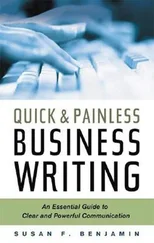Her gaiety was forced, and Greg wasn’t even pretending this was a party. Stephanie held out a glass to Erica and said, “Now I’m off and running. Feeding time upstairs.”
She hurried out and a moment later David McIvey stood in the doorway. “Annette, let’s go.” He didn’t wait for any response, didn’t speak to anyone else, turned and left. With hardly a pause, Annie put down the glass she had lifted to her lips, picked up her purse and followed him without a word. Her cheeks flared with color, and she held her head unnaturally high.
Erica, facing Darren, was startled at the expression that crossed his face and vanished. Stricken, furious, but more, he had looked deeply hurt for that brief moment.
The week before Labor Day Darren moved into the apartment, and parked his truck in the newly cleared garage. His son, he said, would bring some things over during the Labor Day holiday.
“Usually we go camping or something when I have a couple of days off, but he’s excited about having his own room. He wants to pick out the color and paint it himself, hang his posters, make it his room.”
Erica straightened up from weeding a flagstone patio outside the kitchen door. Finding it had been another surprise, hidden as it had been under a layer of dirt, weeds and spreading grass. Sometimes she felt that a miracle had taken place: the house was in decent shape, and they were starting to tackle the job of taming the jungle in the yard. It was turning into a real home. She rubbed her back.
“You said he’s eleven?” she asked.
“Twelve in February. He has a half brother, who is six, and a creep, according to Todd. They share a room. And there’s a half sister, who is ten, and a spoiled brat, again according to Todd. He’s looking forward to his own room, his junk left wherever he puts it down.”
Erica laughed. “The mess on the floor will be his mess. That’s different.”
“Right. Anyway, we’ll be in and out, around, all weekend.” He took a step or two, then paused. “I heard that you asked Bernie to give a copy of the book you’ve been reading to Glory. That was good of you.”
Feeling awkward and even a little embarrassed, Erica said, “Just a cheap paperback, used. Glory mentioned that she would be leaving before we finished The Canterville Ghost and she’d never know how it came out. Sort of like following a serial for nine episodes and missing the tenth and final one.”
“Yeah. And I bet no one in her house has ever owned a book before. Anyway, that was good of you. We’re going to grill salmon tomorrow. Want to come?”
She caught her breath and nodded. “I’d love to. I can make a pretty good potato salad.”
“Deal,” he said, and moved on around to the side of the house and the stairs to the upper apartment.
Trembling, she returned to her weeding with renewed energy. She could finish before dark, tidy up for a cookout. Later she would make the potato salad; it was better if made a day ahead of time. Maybe a cake. She didn’t know if the oven worked; she had not tried it. If it worked, she would bake a cake. She would have to go shopping for ingredients; she knew she had no chocolate, little butter. Cake pans? No matter, the stores were open late. Her thoughts raced, making plans, making a mental list of what to buy. Napkins. Paper plates. Ice cream. They were having a cookout, she, Darren, his child. They were having a cookout on the patio. She was too self-conscious to sing out loud, but under her breath she was singing.
Years before, as a new teacher, she had learned to make a long-range school-year plan, nothing too specific, then a more detailed monthly plan and, finally, a very detailed weekly plan. Year after year the plans had served her well. She laughed to herself when she realized she was still doing it. She was now planning to bake a cake although she had never baked a cake in her life. No matter. She would buy a mix. Even her fifth graders had been able to make cakes with mixes.
Greg and Thomas were in Sid Blankenship’s office the Friday after the holiday. Sid was shorter than either of them, and rounder, fifty years old, with a pink face as smooth as an egg. He had gone to work for his father years ago, and when his father retired, he had inherited the office, furnishings and many of the clients, including Thomas Kelso, who to Sid’s eyes looked to be a hundred years old or older.
They had just concluded the transfer of Thomas’s shares to Greg, which left him out in the cold, Thomas thought morosely. But that was step one.
Sid had filed the petition for a change of the power of acceptance, and they had to wait for the court to get around to it. It was out of their hands, Sid told them.
Now Thomas leaned back in his chair and said, “I keep thinking that what I can’t afford to do is wait around very long. David will have his own attorney go over the bylaws and search for loopholes, of course. Sid, are all court orders open to public scrutiny? Is the power of attorney I have open to scrutiny? Is the power of acceptance?”
He was not reassured by the guarded look that came over Sid’s face as he considered the questions.
“One more,” Thomas said. “Is there anything in the bylaws that would prevent us from forming a nonprofit foundation to ensure a succession of directors without altering our mission statement?”
Sid gazed into space with a thoughtful expression, then said, “Most people assume the power of attorney gives you absolute control, to vote, sell, dispose of, whatever. Likely, David McIvey has assumed that. But you’re right, if an attorney goes digging, he’ll find the documents. As for the foundation idea, I’d have to do a little research. It might require another petition to the court, but off the top of my head, I think it can be done. It would adhere to the original intent of the founders, but it would probably take a majority vote, Thomas, and you don’t have it. Fifty-fifty. Remember? McIvey could simply say no, and that would be it.”
“David can’t handle the workload and has no intention of trying,” Thomas said. “He’ll turn a few shares over to his wife and hang the work around her neck. And the minute he does that he won’t have fifty percent of the shares to vote.”
Sid regarded him soberly for a moment, then said, “I may have limited experience in such matters, but it seems to me that wives generally go along with what their husbands demand unless they’re engaged in a custody battle or a messy divorce.”
Thomas looked at Greg. “You tell him about Annie.”
“Well,” Greg said, groping for a starting place, “she’s pretty special to us, to Naomi and me, I mean. Almost like a daughter. I feel as if I know her pretty well. She grew up on a dairy farm over at Tillamook, then went to college in Monmouth and got out when she was still only twenty-one. She answered an ad in the newspaper for a job at the clinic. Very shy, a little afraid of Eugene, the biggest city she ever lived in, pretty…She was so innocent, not like most kids her age. Anyway, we gave her the job and let her stay in the guest room at the residence for a couple of months. She loves the clinic, the patients, what we do there. After she got married, she began coming as a volunteer. She’s there most days for several hours. I don’t think she’d want the clinic to be turned into a surgical center for wealthy clients.”
Although Sid thought that was a naive view, one which did not answer the question of whether she would cross her husband, he did not voice this opinion. “Okay,” he said. “Let me look into the foundation idea. I think it’s a good one if you can get the majority vote for it. And I think the court would agree. The law approves of an orderly succession of directors, maintaining the status quo. Let me get back to you in a week or two. McIvey isn’t going to do anything until he consults his own attorney. Then you’ll have to have another board meeting to elect Annie McIvey to office. Say she’s in by mid-October. You’ll have to allow another month for McIvey to consider your proposal before you can insist on a vote. Mid-November. Hang on, Thomas. Everything takes time. That’s just the way it is.” He put aside his usual caution then and added, “I think you’ve got him, Thomas. I think you’ve come up with the way out.”
Читать дальше












